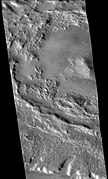 Viking Orbiter 1 image | |
| Planet | Mars |
|---|---|
| Region | Ismenius Lacus quadrangle |
| Coordinates | 42°42′N 328°21′W / 42.7°N 328.35°W |
| Quadrangle | Ismenius Lacus |
| Diameter | 65.25 km (40.54 mi) |
| Eponym | William M. Sinton |
Sinton is a crater in the Ismenius Lacus quadrangle on Mars. Sinton crater lies in the northern hemisphere, south of the very large crater Lyot[1] and west of Ismeniae Fossae. It was named after Harvard astronomer William M. Sinton. The name was approved in 2007.[2]
Description
[edit]Sinton crater is believed to have been caused by an impact into an icefield. This impact melted ice and produced many branched valleys. Some of these can be seen in one of the images below.[3] Evidence of an icefield is lineated valley fill (LVF) and lobate debris aprons (LDA) in the region. Some of this evidence can be seen in one of the images below.[4][5][6][7]
-
MOLA map of Sinton crater and other nearby craters. Colors indicate elevations.
-
West side of Sinton, as seen by CTX camera (on MRO).
-
Channels just to south of Sinton, as seen by CTX camera. These were created when the impact occurred in ice-rich ground. Note: this is an enlargement of the previous image of west side of Sinton.
-
Old glacier just to north of Sinton, as seen by CTX camera. This is one of many glaciers in the region. Note: this is an enlargement of a previous image of west side of Sinton.
See also
[edit]- Climate of Mars
- Geological history of Mars
- Geology of Mars
- Glacier
- Glaciers on Mars
- Impact event
- Ismenius Lacus quadrangle
- List of craters on Mars
- Ore resources on Mars
- Planetary nomenclature
- Water on Mars
References
[edit]- ^ Moore, P. et al. 1990. The Atlas of the Solar System. Crescent Books. NY
- ^ "Gazetteer of Planetary Nomenclature | Sinton". usgs.gov. International Astronomical Union. Retrieved 5 March 2015.
- ^ Morgan, G., J. Head. Sinton Crater, Mars: Evidence for impact into a plateau icefield and melting to produce valley networks at the Hesperin-Amazonian boundary. Icarus: 202, 39-59.
- ^ Lucchitta, B. 1984. Ice and debris in the fretted terrain, Mars. J. Geophys. Res. Suppl. 89, 409.
- ^ Head, J. et al. 2006. Extensive valley glacier deposits in the northern mid-latitudes of Mars: Evidence for Late Amazonian obliquity-driven climate change. Earth Planet. Sci. Lett. 241, 663-671.
- ^ Head, J., et al. 2006. Modification of the dichotomy boundary on Mars by Amazonian mid-latitude regional glaciation. Geophys. Res. Lett. 33, L08S03, doi:10.1029/2005GL024360.
- ^ Morgan, G, J. Head, D. Marchant. 2009. Lineated Valley Fill (LVF) and Lobate Debris Aprons (LDA) in the Deuteronilus mensae northern dichotomy boundary region, Mars: Constrains on the extent, age, and episodicity of Amazonian glacial events. Icarus: 202, 22-38.



